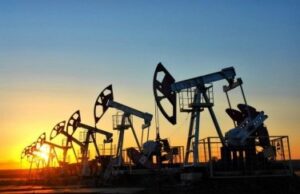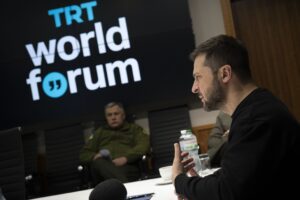
Because of the snowfall that began on Thursday, the movement of transport to the state border checkpoints in several regions has slowed down, the press service of the State Border Guard Service of Ukraine reported.
“The longest queues were formed on the border with Poland at the entrance to the checkpoints “Shehyni”, “Krakivets”, “Rava-Russkaya” in Lviv region, as well as before the checkpoints “Yagodin” and “Ustilug” in Volyn,” – said in the message.
It specifies that at the same time checkpoints in Transcarpathian and Chernivtsi regions are not overloaded.
“Take this information into account when crossing (the border – IF-U). In the meantime, border guards together with employees of the National Police, if necessary, carry out reverse traffic to pass cars and try to clear passengers and vehicles as quickly as possible”, – summarized in the State Border Guard Service.

The cost of February futures for Brent at London’s ICE Futures Exchange is $82.09 per barrel by 7:20 a.m. (KSC), down $0.61 (0.74%) from the close of the previous session. At the close of trading on Wednesday these contracts rose by $2.02 (2.6%) to $82.7 a barrel.
The price of WTI futures for January at electronic trades of the New York Mercantile Exchange (NYMEX) makes $76.52 per barrel by that time, which is $0.76 (0.98%) lower than the final value of the previous session. The contract rose by $1.89 (2.5%) to $77.28 per barrel at the end of last session.
On Wednesday, the International Energy Agency raised its estimate for oil demand growth in 2022 by 140,000 barrels per day (bpd) to 2.3 million bpd. The 2023 demand growth forecast was also raised by 100k bpd to 1.7 million bpd. This gave a boost to the market, writes Bloomberg.
The agency also noted that oil demand remains relatively robust, especially in non-OECD countries.
Meanwhile, the Federal Reserve expectedly raised interest rates by 50 basis points to 4.25-4.5% per year. Meanwhile, the U.S. central bank said in a statement that it plans to keep raising rates so that monetary policy becomes restrictive enough to return inflation to the 2% target. Investors are concerned that tight monetary policy could cause an economic slowdown and, as a result, a drop in demand for oil.
U.S. oil inventories rose 10.23 million barrels to 424.13 million barrels last week, according to a weekly report from the U.S. Energy Department. Experts polled by Bloomberg expected a 3.5 million barrel drop in oil reserves.

LLC “Carton and Paper Company” (Lviv), a major Ukrainian manufacturer of cardboard sleeves and sanitary products in January-November 2022 increased production volume by 50.2% compared to the same period of 2021 – up to 1 billion 076 million UAH.
According to the statistical data of “UkrPapir” association, provided to “Interfax-Ukraine” agency, thus, the company has slightly increased the growth rate of this indicator compared to the same period of the last year (according to 10 months, the increase was 49.4%).
In physical terms, the company has kept the output of base paper for sanitary products almost at last year’s level – 6.42 thousand tons, while increasing the output of toilet paper in rolls by 41% – to 3.7 million pieces.
Production of cardboard products increased insignificantly – to 24.2 thousand tons.
As reported with reference to “UkrPapir” statistics, the mill has continued to work all months from the beginning of this year, reducing the output of paper and paperboard in March (to March 2021), but in April has already gone to a positive trend, which remained in subsequent months.
“Carton and Paper Company” (until 2011 – “Lvivkartonoplast”) produces products and semi-finished products from waste paperboard (cardboard sheets, corners, sleeves), cellulose and recycled waste paper (toilet paper, towels, napkins TM Papero).
In 2021 the company produced UAH 782.7 mln worth of products – 47% more than the year before.

Zhydachiv Pulp and Paper Mill (ZhPPM, Lviv region), which is part of Osnova Holding, increased its output by 23.6% in January-November 2022 compared to the same period of 2021, to UAH 463.5 million.
According to the statistic data given to “Interfax-Ukraine” agency by association “UkrPapir”, thus for 11 months the plant managed to increase this index in comparison with the rate of production increase of the similar period of last year (for 10 months of 2022 it was 21.7% to January-October 2021).
The production of corrugated cardboard boxes is keeping a stable positive dynamics, having increased by 33,7% – up to 17,8 mln. sq. m. Production of containerboard (including corrugated paper) decreased by 13.8% – to 11.8 thousand tons.
At the same time, there was a significant reduction in paper output – down 39.5% to 3,700 tons.
As reported with reference to the Association, in January-November, the total production of paper and cardboard in Ukraine decreased by almost 44% compared to the same period last year – up to 459 tons, corrugated board – by 41.4%, to 404.3 million square meters.
At the same time, the largest Ukrainian producer of corrugated packaging – Rubizhne CPC received damage as a result of Russian aggression and stopped, but its subsidiary in the Kiev region – Tripol packing plant continues to work. According to UkrPapir, over 11 months it produced 1.99 billion UAH worth of products, and corrugated packaging produced 114 million square meters (the second figure after the Kiev KBK).
ZHBK suspended production with the start of the Russian military invasion, but production was resumed in March.
According to the Association, another plant within the Osnova holding, the Izmail Pulp and Paperboard Mill (Odessa region), increased its output by 1% to 213 mln hryvnias in January-November. In volume production of containerboard decreased by 35.9% to 7 thousand tons, corrugated packaging decreased by 43.5% to 10.8 million square meters.

Ukraine welcomes the approval by the European Parliament of a new macro-financial assistance in the amount of EUR 18 billion for 2023 and is waiting for the Council of the European Union to make the final decision soon, implement all necessary procedures and prepare relevant documents, Finance Minister of Ukraine Serhiy Marchenko has said.
“We are expecting to receive the first tranche of EUR 3 billion in January,” he said on air of the national telethon on Wednesday.
The minister also said that it is about a long-term loan for a period of more than 20 years at an interest rate of around 3-4% within a level of risk of the European Commission.

Ukrainian President Volodymyr Zelenskyy in a phone call on Wednesday urged UN Secretary-General António Guterres to send UN experts to Ukrainian energy facilities.
“Thanked António Guterres for attending the conference on supporting Ukraine in Paris. Discussed our peace formula and Global Peace Formula Summit. Called for sending UN experts to Ukrainian energy facilities as soon as possible. We will develop the Black Sea Grain Initiative and the #GrainFromUkraine programme,” he wrote in his Telegram channel.